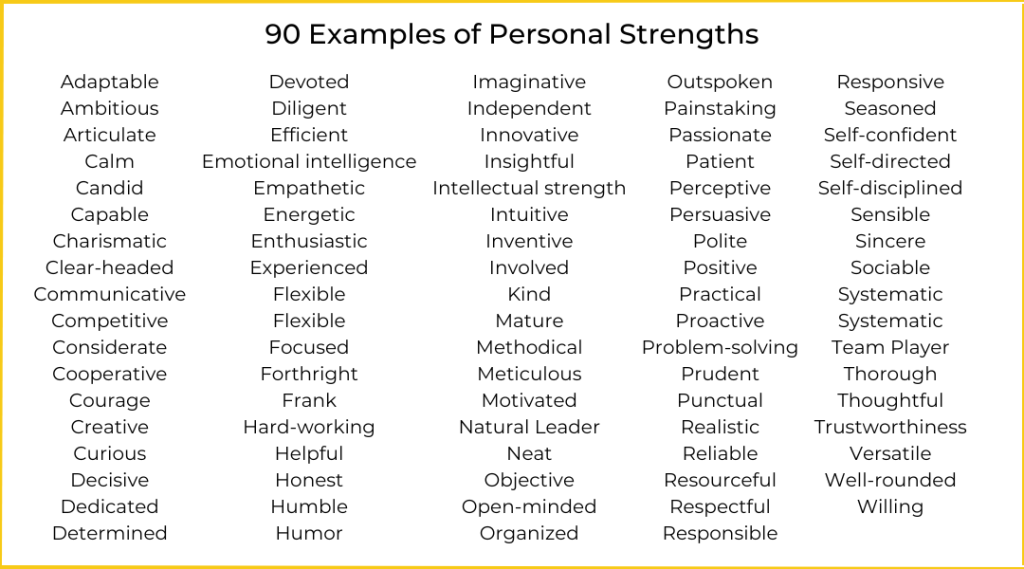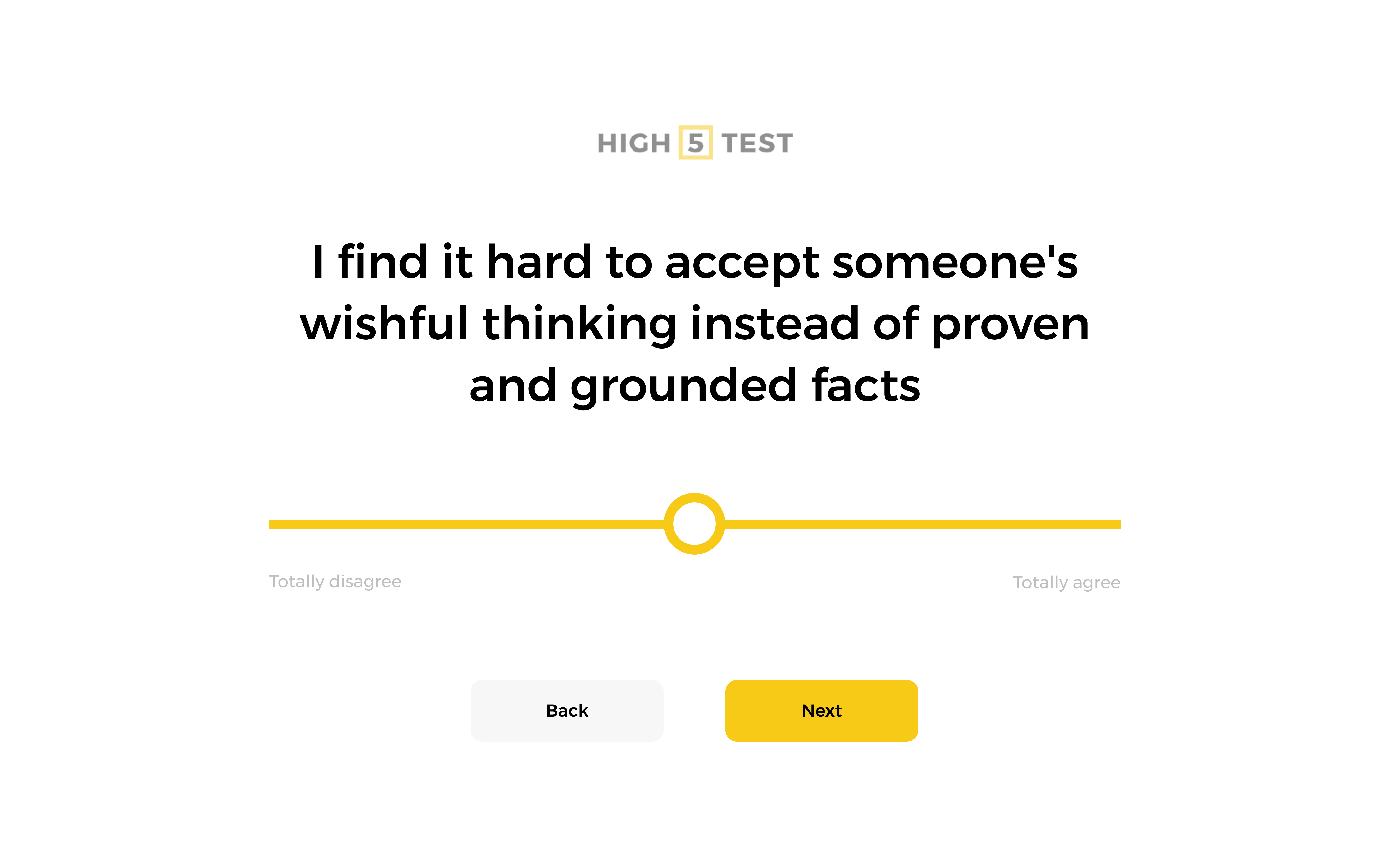Have you ever fixated on past mistakes and struggled with negative self-talk? As a survival mechanism, the human brain is hardwired to focus on the negative as a means of minimizing risk. Unfortunately, these tendencies can have a major impact on the way we think and act. Though remembering our mistakes is essential to learning, when left unchecked, this “negativity bias” can undermine our most productive behavior in relationships and at work. Understanding your strengths can balance your perspective and help you leverage your strengths so that you will be more highly equipped to meet goals and avoid errors.
This article will explore personal strengths at a high level and guide you through identifying your own unique strengths using the HIGH5 test. Finally, we will offer guidance on how to leverage your strengths, ensuring the full application of your abilities within your career.
Pro Tip From HIGH5
Start your journey to self-discovery by taking the HIGH5 test at the beginning of your personal development quest. This will help you understand your baseline and track your progress over time.
What are personal strengths?
All people are born with unique gifts or “aptitudes.” An aptitude is a natural, innate ability that lends itself to the development of skill. For example, a person who naturally harbors a fast reaction time, good hand-eye coordination, excellent balance, and accurate depth perception likely has a high aptitude for athletics, even if that person does not know how to play a sport. Once these aptitudes are identified, they can be honed through practice until they become a skill. Personal strengths are developed aptitudes that allow a person to master and demonstrate a particular skill.
There has been much buzz on personal strengths in the field of positive psychology, the study of human thriving and well-being. But what is the relationship between positive psychology and strengths? One leadership approach that has arisen out of positive psychology is the strengths-based leadership approach. This approach maintains that individuals, teams, and organizations perform at higher rates of success and engagement when leaders focus on the development of strengths, rather than compensation for or development of weaknesses.
Positive psychology maintains that the intentional development and meaningful application of strengths enhance well-being and human flourishing. Dr. Martin Seligman, one of the founders of positive psychology, maintains that to be truly happy, one must be aware and use their “most fundamental strengths” and use them in daily life.
Pro Tip From HIGH5
Reflect on how each strength listed in the HIGH5 results applies to your daily interactions and responsibilities. This can increase your effectiveness in personal and professional environments.
90 examples of personal strengths
- Adaptable
- Ambitious
- Articulate
- Calm
- Candid
- Capable
- Charismatic
- Clear-headed
- Communicative
- Competitive
- Considerate
- Cooperative
- Courage
- Creative
- Curious
- Decisive
- Dedicated
- Determined
- Devoted
- Diligent
- Efficient
- Emotional intelligence
- Empathetic
- Energetic
- Enthusiastic
- Experienced
- Flexible
- Focused
- Forthright
- Frank
- Hard-working
- Helpful
- Honest
- Humble
- Humor
- Imaginative
- Independent
- Innovative
- Insightful
- Intellectual strength
- Intuitive
- Inventive
- Involved
- Kind
- Mature
- Methodical
- Meticulous
- Motivated
- Natural Leader
- Neat
- Objective
- Open-minded
- Organized
- Outspoken
- Painstaking
- Passionate
- Patient
- Perceptive
- Persuasive
- Polite
- Positive
- Practical
- Pragmatic
- Proactive
- Problem-solving
- Prudent
- Punctual
- Realistic
- Reliable
- Resourceful
- Respectful
- Responsible
- Responsive
- Seasoned
- Self-confident
- Self-directed
- Self-disciplined
- Self-motivated
- Self-aware
- Sensible
- Sincere
- Sociable
- Systematic
- Team player
- Thorough
- Thoughtful
- Trustworthiness
- Versatile
- Well-rounded
- Willing

What are personal weaknesses? Definition
Positive psychology and strength-based leadership caution against an over-emphasis on deficits in people and systems. Whereas other leadership approaches often focus on the question, “What’s wrong?” strength-based leadership asks, “What’s possible?” Business visionary Peter Drucker summarized this approach well when he said, “The task of leadership is to create an alignment of strengths in ways that make a system’s weaknesses irrelevant.”
Benefits of discovering your strengths
Understanding one’s strengths and weaknesses is fundamental to positive psychology, serving as both a foundation for theory and a cornerstone of therapeutic practices. Discovering your strengths through a tool like the HIGH5 test can transform this understanding into a practical asset, enabling you to harness these strengths in daily life. This strategic application supports not just personal well-being but also professional efficacy, turning everyday challenges into opportunities for growth and achievement.
Pro Tip From HIGH5
Use the insights from the HIGH5 test to set targeted goals in your personal and professional life, focusing on areas where your strengths can have the most impact.
Several studies back up the benefits of exploration and knowledge of an individual’s strengths. Below are some studies that show how knowing one’s strengths has a positive impact on a person’s life.
- A literature review on the use of strengths in organizations found that the intentional application of strengths has led to improved well-being, work engagement, work performance, and job satisfaction in the workplace.
- A character strengths-based program incorporated into the curriculum of adolescent students led to a significant increase in their life satisfaction and well-being. A similar study conducted on undergraduates found that awareness of strengths led to improved measures of well-being, happiness, and health and a decrease in negative emotions and loneliness.
- One study found that understanding of strengths improved student well-being and is positively correlated to academic achievement. In the same vein, college students who know their strengths and capitalize on them will use social support and create successful experiences that provide them with opportunities to use their strengths in novel situations.
- Numerous studies found that a strengths-based approach to client care and management improves not only health professionals’ service towards patients but also leads to more positive relationships between clients and their caregivers.
- Therapists and counselors help their clients discover their strengths and utilize them in the therapeutic process to facilitate growth.
1. Greater Self-Knowledge
Knowing yourself and your weaknesses and strengths helps you identify the types of situations and tasks in which you are likely to excel. Conversely, this self-knowledge will also help you identify tasks and situations in which you are likely to face difficulty. This knowledge enables you to more accurately identify the roles and responsibilities that will likely pose a challenge to you.
2. Recognition of growth opportunities
Self-improvement begins with self-awareness. Knowing your strengths and weaknesses provides an opportunity to decide which aptitudes you might wish to develop into skills. Through positive psychology and strength-based leadership, do not focus on weaknesses; you may identify weaknesses that you do wish to develop and improve. The choice is yours!
3. Improves self-confidence
Many people live their lives unaware of their innate strengths and gifts. An awareness of the strengths that make you unique can improve your self-esteem and self-efficacy in work and life.
4. Heightens appreciation for differences
Often, we assume that the people around us are like us, when in reality, each person is unique in their strengths, drivers, preferences, and personality traits. The more we work with people who have different strengths, the more we can come to appreciate the value of differences in others.
5. Improves self-esteem
Everyone has quirks and idiosyncrasies. While we may dismiss them as “weird traits,” they could be related to your strengths. Acknowledgment of strengths in relation to what may seem like an arbitrary trait can improve self-esteem.
Tips for identifying your character strengths
In the professional world, it is common to be asked about your strengths, especially in job interviews. The HIGH5 test can help you identify your strengths so that you can speak to them with confidence at pivotal moments throughout your career. Though the list of strengths that a person may have can be endless, they can often be grouped into three categories: knowledge-based skills, soft skills, and personal skills.
Knowledge-based skills
These skills usually include role-specific abilities and are generally acquired through education, training, and relevant experience. This includes relevant skills and knowledge you may have earned from an academic degree or formal training.
Soft skills
These are traits that are not tied to any specific job. For this reason, they are sometimes called transferable skills. These include problem-solving skills, critical thinking, leadership, analytical thinking, and communication skills.
Personal skills
These include unique qualities that help you relate to, and work with other people. People with strong personal skills are often energetic, friendly, cooperative, and good communicators.
Ways to identify and measure your strengths
HIGH5
Several strengths assessments are available to help you on your personal development journey. One is the HIGH5 test. This assessment stands out as a premier, no-cost tool for identifying your personal strengths, offering detailed, actionable insight that helps you understand and apply your strengths in various aspects of your life.
Beyond merely identifying strengths, strengths-based assessment HIGH5 offers an actionable roadmap for personal growth, teamwork, communication, and productivity improvements. It empowers individuals to harness their innate talents, fostering a strengths-based approach to personal and professional challenges. This strengths perspective not only elevates self-awareness but also promotes a more fulfilling and productive life.
For teams and organizations, the HIGH5 test serves as a cornerstone for building a positive, strengths-focused culture. By highlighting and leveraging the unique strengths of each member, teams can achieve superior performance, foster innovative collaboration, and minimize conflict. The test’s insights help in crafting tailored development programs, driving engagement, and facilitating effective talent management strategies.
VIA Character
Another assessment that focuses on strengths, particularly those related to character, is the VIA Character Strengths Survey. This assessment includes a survey that measures 24 character strengths from 6 virtue clusters. Results include a list of the individual’s top 5 strengths, as well as middle and lesser strengths.
CliftonStrengths
Finally, the CliftonStrengths Assessment, formerly called StrengthsFinder, is a paid assessment that provides individuals with a “talent DNA,” profile. Individuals who take the assessment learn their top inner traits in the context of actionable strengths.
Pro Tip From HIGH5
Regularly revisit your HIGH5 test results to realign your goals and strategies with your core strengths, ensuring continuous personal growth and adaptation.
Step-by-step guide on how to identify personal strengths
Here’s how to get started with HIGH5:
- Visit the HIGH5 test page: Navigate to the HIGH5 test page and create an account. This enables secure access to your results and tracking progress over time.
- Complete the assessment: The test consists of multiple-choice questions designed to assess your natural responses intuitively. Answer honestly for the most accurate insight into your top five strengths. The assessment takes about 20 minutes.
- Review your results: After completing the test, you’ll receive a detailed report outlining your primary strengths, with practical examples of how they are applied in daily and professional settings. This report is crucial for understanding and leveraging your innate talents.
- Apply your strengths: Once you know your top strengths, actively seek opportunities to apply them. Professionally, volunteer for projects or discuss role adjustments that capitalize on your natural abilities. In team environments, encourage assigning tasks based on individual strengths to boost productivity and morale.
What are professional strengths?
While strengths are personal, they can be translated into the context of different spheres of our lives, including the workplace. Thus, personal and professional strengths are the same but only differ in how they are applied.
HIGH5 for Professional Development
By recognizing and strategically leveraging your top strengths identified through the HIGH5 Test, you can navigate your career path more effectively, ensuring that your personal capabilities are recognized and put to good use.
By setting professional development objectives that align with your HIGH5 strengths profile, you’re strategically positioning yourself on a career path that capitalizes on your inherent talents and promotes ongoing personal and professional growth. This approach ensures that you’re seeking roles that align with your unique strengths.
The strategic application of HIGH5 strengths in professional settings creates a symbiotic relationship between individual fulfillment and organizational success. When employees are engaged in roles that mirror their strengths, the result is a dynamic, positive, and productive workplace culture.
This approach benefits the individual by providing a clear path to personal achievement and satisfaction. It creates a work environment where everyone is positioned to contribute their best, driving collective success and innovation.
Pro Tip From HIGH5
Discuss your HIGH5 strengths during performance reviews or career planning sessions to illustrate your unique contributions and potential for future roles.
Professional strengths in the workplace and for job interviews
Professional strengths can be highlighted by framing strengths in the context of the workplace. For example, the character strength of curiosity can be described as openness to new ideas in the workplace.
Teamwork and loyalty can be described as strengths that allow a person to prioritize group goals above self-interests. Kindness and generosity can be described as the ability to demonstrate empathy towards teammates. Knowing your professional strengths will help you sift through jobs and even roles and tasks within the jobs that best suit your preferences. Feel free to take HIGH5’s career aptitude test to discover your ideal career paths based on your strengths and talents.
Personal strengths and traits of leaders and managers
Communication strengths
Effective communication is essential for leaders. Leaders regularly rely on communication skills to describe vision, provide clear instructions, offer actionable feedback, resolve conflicts, and offer encouragement. However, communication is more than just the ability to transmit messages. Effective communicators also use active listening to glean important information within their teams and operations.
Strengths for providing guidance and direction
Leaders set team goals that align with their organization’s broader organizational goals, vision, and values. Creativity and foresight are crucial not only for goal setting but also for envisioning and communicating the desired outcomes that goal attainment will achieve. Effective leaders don’t set goals for the sake of setting goals.
Strengths for supporting staff
A leader’s ability to recognize employees’ strengths and leverage them through strategic delegation is essential in group development. Aside from this, leaders should provide timely and frequent feedback and encouragement.
Strengths for decision-making and judgment
As key decision-makers for their teams and within their organizations, leaders must know how to collect the information necessary to make informed decisions. From this point, leaders must be able to discern what data is relevant to their decision and use that data in conjunction with priorities to choose the best available option.
Organizing and planning strengths
Planning and organization are vital when managing a team. As we’ve already explored, competent leaders set goals and have clear, detailed plans to achieve them. Part of this work involves assigning tasks and delegating work within the team. From this point, monitoring progress and providing support is essential to achieving goals.
Problem-solving strengths
Though good communication, relevant goal-setting, and thorough planning will prevent the emergence of many problems, no one can entirely eliminate problems and setbacks. As a result, the best leaders have developed the ability to solve problems expediently and thoughtfully. Problem-solving requires a keen eye to notice issues before they become too detrimental. From here, leaders gather the relevant information necessary to analyze and fully understand the problem and its contributing factors before determining the best available solution. In this way, good leaders as problem-solvers can usually spot connections between situations and events.
Application of strengths in daily life
Embedding HIGH5-identified strengths into daily life is a powerful strategy to enhance your personal and professional life. It sets the stage for more informed decision-making, richer engagement with hobbies, and fortified resilience against life’s inevitable challenges.
Whether leveraging your HIGH5 strength of decisiveness for confident decision-making, utilizing empathy to deepen and enrich relationships, or applying organizational prowess to manage community projects more efficiently, recognizing and using our inherent talents can profoundly enrich our life experiences and spur personal development.
This method not only fortifies our resilience, reminding us of our inherent capacity to navigate through difficulties but also amplifies our contributions and fulfillment across various aspects of life. By consciously applying your HIGH5 strengths, you pave the way for a life characterized by purpose, satisfaction, and exceptional effectiveness.
In doing so, we don’t just live; we thrive – using the insights from HIGH5 to guide us toward realizing our full potential and leaving a meaningful impact on the world around us.
Related articles:














